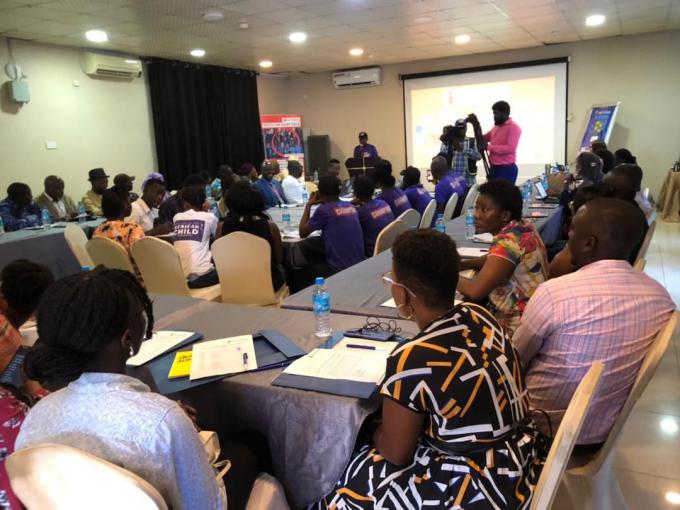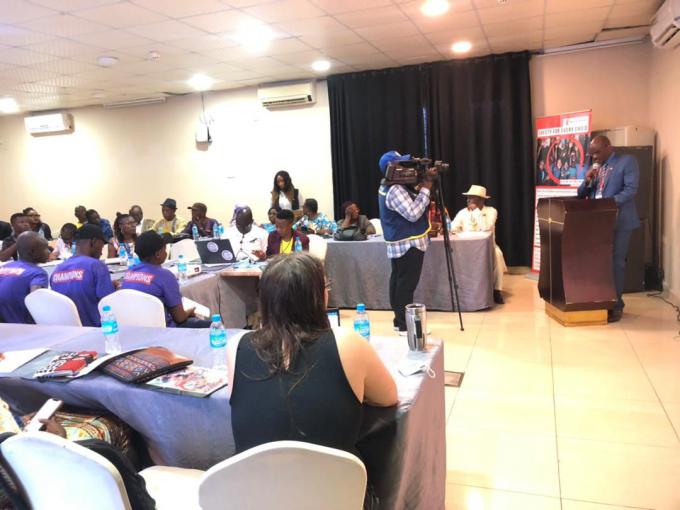Save the Children engages Parliamentarians on Budget and Political Economy analysis on Ending Child Marriage

Theresa James, CFN member from Kailahun chairs the meeting with Parliamentarians, UN Agencies, Donors, NGOs and children at Country Lodge, Freetown, 20, September, 2022. Photo credit: Abdul Sillah, Save the Children
On Tuesday 20 September, Save the Children held a dissemination meeting for the Budget and Political Economy Analysis for Sierra Leone, with 29 Parliamentarians including Paramount chiefs in parliament, UN Agencies, civil society organizations, child and youth champions at the Country Lodge, Freetown.
The event was chaired by Theresa James, member of Children Forum Network (CFN) from Kailahun and child champions who posed questions to law makers and decision makers on the effectiveness of laws protecting children, adequate level of resources in place for protection and calling for more child participation in decision making around protection.
Launched by the Country Director, Patrick Analo, the Budget ad Political Economy Analysis on Ending Child Marriage focused on national policy frameworks and budgets to address child marriage annual budget allocations at national and district level, specifically Kailahun.
Patrick encouraged law makers to use information they receive from findings to speak out for the protection of girls and take necessary steps to ensure girls are protected by strong national laws.
“We hope that the information shared today will guide all of us to take the necessary steps to not only invest in protecting girls, but also inform you as key decision makers to ensure Sierra Leone has laws that will protect girls from all forms of violence and exploitation,” Patrick said.

Patrick Analo, Country Director for Save the Children, launches dissemination meeting at Country Lodge in Freetown, 20 September, 2022. Photo credit: Abdul Sillah, Save the Children
Responding to the statement, Honorable Catherine Tarawallie, Chair for the Gender and Children’s Oversight Committee, assured children that she will continue to champion for laws to protect children and guaranteed children a wonderful future. She stated that national laws prohibit marriage under the age of 18 however, these laws are not upheld. She agreed that children should be consulted and that progress without them was not possible. Although they were in the process of looking at the reviewed 2007 Child Rights Act, there is still need for a particular Bill to end child marriage.
She assured children “We will not fail you. I cannot fail you as a champion. We want the laws to stand the test of time and make sure that we keep you safe.”
Findings:
Referring to Demographic Health Survey, 2019, consultants highlighted shocking health and education statistics exacerbating protection and development issues for girls in Kailahun district. Over 50 percent of girls aged 15-19 were either pregnant of started child bearing. 75.7 percent of the female population in the district could not read and only two women in hundred finishing secondary school.
The analysis showed:
· Government commitment to addressing teenage pregnancy and prerequisites to addressing child marriage
· A mismatch between policies and budgets to address gender-based violence and protection for girls. This was evident in inadequate budget allocations to Ministry of Gender and Children’s Affairs (MGCA) and National Commission for Children (NCC)
· Conflict in laws like the Sexual Offences Act (2012) which states that sex under age 18 is illegal compared to Customary marriage and Divorce Act (2009) which allows marriage at 16 with parental consent
· Almost 90 per cent of ECM activities budget for in 2019 did not receive funds
In deliberations, parliamentarians recognized the need for stronger laws and also encouraged children to participate in national budget hearings starting 23, September. They re-echoed commitments to fight against child early forced marriage and teenage pregnancy, promising to advocate for increased budgets for ministries and institutions mandated to meet the protection and welfare needs of children.
 Sierra Leone
Sierra Leone